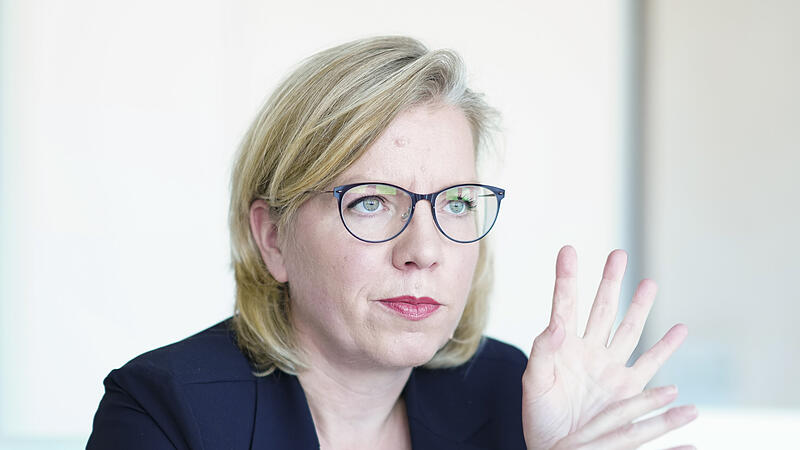Image: APA/Manhart
Furthermore, Austria should secure gas volumes from OMV in Norway and Romania, including transport capacities. However, this is not coordinated within the government, Gewessler sees the measures as the start of a debate.
Specifically, the minister’s plans provide for Austrian energy companies to assume the obligation to store non-Russian gas in storage for the electricity supply – and receive support from the state for this, but not full cost recovery. Already today, the energy companies would have to store gas reserves for their protected customers, this should now also apply to the gas required for electricity generation.
Video: Energy Minister Leonore Gewessler (Greens) spoke in ZiB2 about her new strategy, according to which Austria can exit Russian gas by 2027.
Gas from Romania and Norway
The corresponding transport capacities should be booked for securing gas from Romania and Norway. This should be done by a company commissioned by the federal government. The gas from Romania is related to the “Neptune” project in the Black Sea. OMV CEO Alfred Stern wants to invest up to two billion euros in the project, he said in May last year. A decision should be made by 2023 at the latest, Stern announced at the time. The first gas could flow four years later.
The existing contracts with the Russian energy group Gazprom are to be excluded from the transfer of the OMV gas business to ÖBAG, although this is not likely to be the only catch in the re-nationalization. Because at OMV, it is not only the state that has a say, which only holds a 31.5 percent stake in ÖBAG. 24.9 percent are held by MPPH (Mubadala Petroleum and Petrochemicals Holding Company) based in Abu Dhabi, the rest is in free float.
Not a new idea
The idea of nationalizing the OMV gas trading subsidiary OGMT is not new and was already aired by ex-OMV boss Gerhard Roiss and the current OMV boss Alfred Stern in December of the previous year. Finance Minister Magnus Brunner (ÖVP), as owner representative of ÖBAG, reacted cautiously at the time. Brunner said at the end of last year that he would not interfere in operational matters at OMV.
Gewessler sought the advice of energy expert Walter Boltz and von Roiss for the latest plans. According to Boltz, the companies would have to store around ten terawatt hours, and Austria should have 60 percent of its annual gas requirements in storage. However, the gas cannot be stored entirely in Austria because the storage capacities are too small. In any case, the gas supply should last for six months.
Storage levels at around 67 percent
The storage levels are currently around 67 percent – after 13 percent in the spring of last year. However, these gas quantities are not intended exclusively for Austria. Gas prices have dropped significantly, but the situation remains tense, Gewessler told journalists. According to EU plans, the aim is to become independent of Russian gas by 2027, because “blackmail” with gas has dramatic effects.
Roiss, in turn, refers to the lack of transport capacity in the “Oberösterreichische Nachrichten” on Saturday. “The transit line West-Austria-Gasleitung, WAG, is too small on the way from Oberkappel towards Baumgarten,” said Roiss. The dimensions of the line would have to be increased by around 180 million euros from 80 to 120 centimetres. In his opinion, this project should be feasible in up to 15 months. Austria could thus obtain 3 billion cubic meters of gas from northern and western Europe – with an annual requirement of 7 billion cubic meters. At the same time, the previously controversial 110 kV high-voltage line could also be relocated.
“Starting a Debate”
When asked to what extent the measures had been agreed with the government partner ÖVP, Gewessler said that he knew that her ministry was preparing proposals. The next steps presented for gas supply are the start of a debate that goes far beyond the energy sector.
The Ministry of Finance supports every measure that contributes to the common goal of the Federal Government and supports the Federal Ministry for Climate Protection in its own sphere of influence to accelerate the phase-out of Russian gas, the BMF announced. ÖBAG had already presented a study on this in December. “The BMF is therefore still skeptical about the specific proposal to separate and nationalize the OMV guest subsidiary OGMT,” the Ministry of Finance further noted.
ÖBAG is skeptical
But ÖBAG is also rather skeptical: From their point of view, “the gas coordination office would continue to be the most effective measure to secure gas supplies in Austria within the framework of energy policy responsibility,” ÖBAG said in a statement. Implementation would not have to be carried out by ÖBAG, but by the ministry responsible for energy policy tasks. However, she supports all measures to secure the gas supply. But: “The concept published yesterday raises more questions than answers.”
Sharp criticism from the FPÖ
On Saturday, FPÖ spokesman for energy and business, Axel Kassegger, was sharply critical: “Just going public with this idea without internal government coordination and, above all, without an overall strategy is grossly negligent. Minister Gewessler is thus continuing her energy-political ghost trip.” Many crucial questions remain unanswered, such as what will happen to the company as a whole if the gas trading subsidiary OGMT is spun off.
In a statement, the Neos referred to possible solutions: “Since the beginning of the war, we have repeatedly put options on the table as to how gas can be brought to Austria from non-Russian sources, most recently with the proposal for a law that would make it possible for the OMV comes out of the long-term and unspeakable contracts,” said Neos energy spokeswoman Karin Doppelbauer.
more from economy




